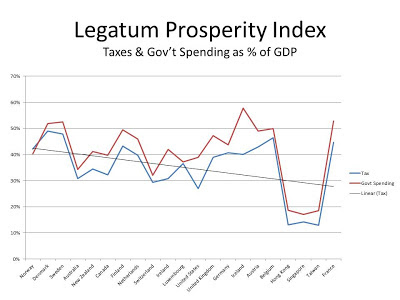Norway, Denmark,
and Sweden top the list. These three countries spend and tax a great deal (tax rates an average of 46% of GDP and government spending an average of 48% - nearly half - of GDP). In the following chart, you can see the top 21 countries,
ranked from left to right. The lines measure taxes and government spending as a
percentage of GDP. Further, there is a simple trend line
that shows that as national ranking drops, so do spending and taxes.
Spending seems neither good or evil but instead necessary for the creation of a prosperous nation.
The Legatum Institute’s measure of prosperity is both complex and reasonable. If a country’s people have high incomes but few freedoms, it gets a lower score. The score also drops if its economic prosperity comes at the expense of health. The index makes an attempt to measure future prospects. Education is one obvious way to measure that but one of the more interesting variables is that of entrepreneurship and opportunity; if your people currently have high incomes but there is little entrepreneurial opportunity or activity, your ranking drops. (It doesn't seem as though they included environment, though. It seems that a measure of prosperity should take account for the loss of natural resources that comes from drawing down oil or fresh water reserves or polluting air and water.)
The Legatum Institute’s measure of prosperity is both complex and reasonable. If a country’s people have high incomes but few freedoms, it gets a lower score. The score also drops if its economic prosperity comes at the expense of health. The index makes an attempt to measure future prospects. Education is one obvious way to measure that but one of the more interesting variables is that of entrepreneurship and opportunity; if your people currently have high incomes but there is little entrepreneurial opportunity or activity, your ranking drops. (It doesn't seem as though they included environment, though. It seems that a measure of prosperity should take account for the loss of natural resources that comes from drawing down oil or fresh water reserves or polluting air and water.)
This seems to affirm that prosperity is more complicated than just declaring freedoms.
"You are free to learn what you would like" is not nearly as
empowering as "You will have access to free education, education that we
will hold to a particular standard. And not only are your parents required to
send you to school but we have laws that prohibit child labor." And
this may be the simplest explanation for why cutting government spending and
taxes does not simply lead to more prosperity and may actually diminish it. Freedom is not the same as empowerment.
Edward Deci
distinguished between three different styles of parenting or managing. I would
say that the styles also apply to governing. The first style is controlling,
dictating to children, employees or citizens what to do. The second style is
abandonment, or freedom, letting children, employees, or citizens do whatever
they want. Deci's third and recommended style is what he called
autonomy-supportive. In this model, children and employees and citizens alike
are the one's - ultimately - who have the power to choose and decide what to
do. But rather than just given freedom to do what they want, they are supported by parents,
teachers, and governments who enable them to realize their goals with a combination of education and resources.
Deci's third style
of governing suggests that a government that enables its people by helping them
to be healthier, better educated, and to have better access to capital,
information technology and a fair legal system will be more prosperous. And Legatum’s prosperity index seems to support that very claim. Empowerment is not the same as freedom nor is it free.
High tax rates and government
spending can inhibit prosperity but not nearly as much as a failure to
invest in quality healthcare, education and governance. Prosperity depends on investment and that is just as true of nations as it is individuals.


No comments:
Post a Comment